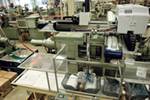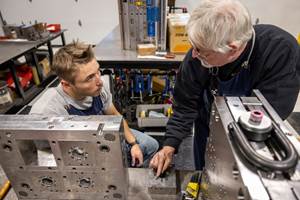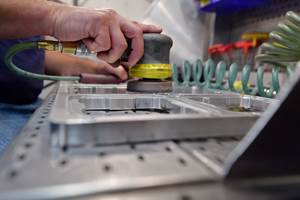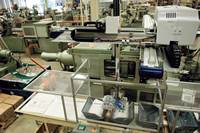Alliance Engineering: If You Can't Beat 'Em, Join 'Em!
Mold shop offers an alternative - less expensive molds that they outsource overseas.
The talk around the water cooler at many mold shops today is foreign competition - more and more bids are getting lost to overseas companies, leaving moldmakers frustrated and constantly challenged to find innovative ways to stay competitive.
Westminster Tool, Inc. - a Plainfield, CT-based moldmaker specializing in molds that require tight tolerances in the medical and automotive industries - decided to take a controversial yet proactive course of action. Owner Ray Coombs formed a brand new company that actually sources molds from overseas - giving his company the ability to more fully service its own customer base in tough economic times.
Alliance Engineering - an offshoot of Westminster Tool - is approximately a year and a half old and was formed to take advantage of a global economy, according to Bob Furst, its vice president of engineering. Basically, Westminster Tool is able to offer its customers two types of molds: the first, and more expensive, is a Westminster mold. The second option, which is 15 to 35 percent less expensive, is built in Taiwan and shipped to Alliance Engineering. Both companies occupy the same 5,000-square-foot building.
In the Beginning
According to Furst, Coombs was dismayed that his shop was losing molds to foreign competition and agonized over ways to counteract this competition without losing any more business. "Price was starting to become more and more of an issue to a lot of customers - and not just compared to other New England tool shops. Customers were being driven to reduce their tooling costs by 10, 20, 30, 40 percent," he explains. "Money was becoming the major force that was driving customers to go elsewhere; quality and timing were never an issue. And, when Ray did a little more digging, he kept hearing how customers are being 'forced' to buy a mold overseas as it was the only way they could meet their customer's cost target.
"Rather than sitting around and throwing up his hands, Ray then started thinking about ways he could use the situation to his advantage," Furst continues. "So, during a six-month period he started talking to colleagues and suppliers. Then he and I started talking - at the time I was an engineering manager at a custom molder. His basic concept was starting a company that would source the tools overseas, bring them in and provide them at a lower cost - knowing that it wouldn't be a Westminster tool, but would still have the backing of Westminster when the tool was delivered. Then customers would not be dealing with a broker or having to go direct. We decided it should be a full package - Westminster would do the design, sourcing, program management and shipping and deal with customs. When the mold comes in, Westminster cleans it up, inspects it, handles any last minute grooming, delivers the mold and then stands behind it. What could be better than that?"
Furst thought the idea was "absolutely wonderful" and joined Coombs several months later to form Alliance Engineering and get the venture off of the ground. "If customers can afford to buy a Westminster mold, that's great. But if they can't, they have an alternative in Alliance," Furst states. "And we are not acting like a broker, we are providing a service - a full-service package, a one-price deal.
"One of the things we did was take the basic philosophy that had been so successful for Westminster Tool and use that as the preceptor and guiding principle on how to get Alliance up and running," Furst continues. "Ray built Westminster's reputation on building tough molds - a majority of them have either unscrewing actions or side actions - quickly, with on-time delivery and good pricing. The company also recognizes that the entire process of building a mold is really dictated by design. We build to numbers. Our designs are fully detailed and when the toolmakers pull up their respective portion, they know exactly what they have to do. In order to hit the short leadtimes, we spend the time on design so that the toolmaker doesn't have to spend a lot of time at the back end of the program to finesse and tweak things. This is why Westminster is successful, and we feel we can carry that success over to Alliance."
The design staff of Westminster Tool handles the entire design of Alliance molds sourced from overseas. "By specifying full details on everything, we are leaving nothing to chance or speculation - and this includes leader pins, bushings and parting line locks. We don't want anything done independently," Furst emphasizes. "We make it clear what we want and expect."
Doing the Legwork
Then came the hard part - running with the idea. "There was a lot of research that went into developing Alliance Engineering," Furst states. "I targeted companies with which to work, used trade magazine articles that talked about industry trends, sought out sources that I have developed throughout the years and combined all of this with the quality and pricing I was looking for. This led us to Taiwan - which has quality tool shops with prices at a point where we can get the value-added extras we need and still source molds with our markup, make a profit and offer our customers savings. We can offer savings of anywhere from 15 to 20 percent for a small mold to 30 to 35 percent for a larger, more complicated mold. Other countries like Japan and Korea, although they have very good reputations, have higher prices and the ultimate savings I would be able to pass on to a customer would not be good enough to make it attractive for this to get going. We chose to only review but not use mainland China at this time - based on rumors we had heard of lesser quality and unfair trade practices."
Once Furst settled on Taiwan, the next hurdle was to find reputable mold shops to work with. He then put some systems in place to deal with suppliers on a long-term basis, as well as to simply help narrow down his initial list of approximately 50 moldmakers. "I needed a way to communicate with them effectively in terms of the molds that I needed and the technology I was looking for," he recalls. "If I was going to specify a mold, how would I spec it? How would I get the mold back here? I had to get into all of the shipping and customs requirements. Much of this was centered on forms that would keep communications focused on 'universally' accepted terminology, so as not to get into slang terms that could cause confusion. Initial forms and documentation included a two-page mold specification sheet and a 10-page set of mold design guidelines. Once I had my arms around that, I went back to my list of companies and started supplying them with this documentation to see what kind of responses I would receive. The very first request was more of a test of the system than anything else to try the form and see what questions came up - for example, if any changes in general terminology were needed or if there were any differences in specifying steel or components.
"Out of all of the companies, probably 20 or so didn't respond, which I found a bit surprising," Furst continues. "Website references and company literature were the main vehicle to narrow down the 30 companies that responded to 15 or so. In this round of reviews, I was seeking general capabilities, product (tool) size, and a little pure 'gut feel' for an ability to support our needs. Product and tooling size is important since Westminster would be supporting these projects upon arrival, and wanted to stay within the capabilities of Westminster as well.
"Then, I started the next round of information sharing - supplying a survey that I developed that asks about their design and machining capabilities, the kind of products they developed, the company's size and several domestic references," he adds. "Size is important to me because I wanted to work with companies that were not going to be so small that I would potentially overwhelm them with too much work, or not so big that I would get lost and not get any attention. Then I cut the list down to about eight. By now several weeks had gone by - along with the exchange of numerous e-mails, requests for quotes and general information. This time and level of communication allowed me to see which suppliers were responsive, helpful, competitive and willing to support Alliance - all of which helped in the screening process."
The list of references provided by each company was used to further narrow the list down to the present four steady sources, Furst points out. "I asked each reference the following questions: How well do they execute design? What quality issues did you experience? Do they inform you of problems on a timely basis? What other type of problems have you experienced? Do they actually meet the deadlines that were agreed to at the beginning of the program?" All of this took several months.
Taking the Plunge
It was now time for Furst to put Alliance Engineering - and his overseas moldmakers - to the test. "For the first mold - to minimize our risk and also learn something - we built the frame here and sourced the core and cavity set from two different Taiwanese companies," he says. "It gave us twice the exposure right away to see how both companies worked and to see if our system worked. We didn't make any money on it, but we received two for the price of one at the Westminster price. We gave our customer both sets and told him there was no extra charge. It was a bit of a test and they were the lucky ones to get both cavities."
Since then, Alliance has had several molds built overseas successfully. Richard Gavlik, business unit leader of PolyVac, Inc. (Manchester, NH) - a manufacturer of medical trays and containers that can be sterilized - says he cannot tell the difference between an Alliance mold and any U.S. molds he has sourced. "We have not had any trouble with the mold at all," Gavlik notes of the Alliance mold he purchased last March. "It saved me a lot of money. Alliance Engineering is now part of my standard list of companies I request quotes from."
Echoing these sentiments is Matthew McKenney, a plastic molding engineer for Micro Contacts, Inc. (Warwick, RI) - a supplier of precision components for electromechanical applications. "It's early in the process, but so far so good," he notes. "There were a few minor glitches with dimensions and water issues, but they were quickly resolved. The key to the Alliance concept versus Taiwan/China direct is the domestic support. It is the only way Micro Contacts would consider offshore tooling. We also placed a tool from the same package domestically with Alliance's parent company, Westminster Tool, Inc. Not every tool is an offshore candidate, but having a supplier who can provide both options is a big plus."
"I think we are taking some of that fear of the unknown out of it by being the ones who are doing the spec work and the program management," Furst agrees. "Plus, when the mold comes in, we are standing behind it - we are not just dropping it off on their dock and running. We are in this for the long run. We want our customers to be happy and we are doing this as a service to them - trying to be a more full-service supplier and offering our customers options. Now, we just don't turn customers away because we can't reach their price target, we give them this alternative."
While Alliance Engineering does stand behind its molds, Furst admits that there are some differences between a Westminster and an Alliance mold. "Aside from the high quality of the product molding, a Westminster mold will leave our shop with chamfers on all plates that are machined, vents that are ground - little things that stand out to make a tool look like a top-shelf mold. An Alliance mold does not feature that nice uniform appearance, but we are looking to improve upon that through better communication with our overseas sources. Still, these subtle differences do not impact the final quality of the finished mold - both still have tight tolerances, the proper finish, etc."
An Optimistic Future
Next on Alliance Engineering's agenda is to grow the business. "Right now we need to expand our visibility and get the word out to more customers," Furst states. "Currently we are working with Westminster's customer base and our immediate plans include phone calls, phone calls and more phone calls!"
To that end, the company also has begun to advertise and will exhibit at some trade shows to display mold components and molded products. "We couldn't have picked a worse year to start this venture," Furst reflects. "The economy last year was just plain awful! In the long run, the business we are seeing right now reflects the overall economy. Quoting is very strong. We are consistently quoting anywhere between 50 and 100 molds per week between the two companies, and Alliance is quoting a fair share of those. Companies are being very conservative in terms of new programs, and they are being tough in terms of pricing, which I believe will be vital to Alliance's growth. People are beginning to realize that Alliance can provide a valuable service and allow them to be more competitive, knowing that they have a local toolmaker for support."
Related Content
MGS Mfg Group Acquires Danish Product Design Firm Technolution
The partnership is said to create a unique position in the global healthcare value chain, combining MGS’ specialization in precision plastics and tooling with Technolution’s R&D and project management.
Read MoreEden Tool and Eden Manufacturing: A Story of Resilience, Growth and Innovation
This critical parts manufacturer, founded on solid tooling fundamentals, didn’t get derailed with the unexpected passing of the owner because leadership was already building a solid business, not just a good tool shop. Here’s how they managed change incrementally… and they’re not finished yet.
Read MoreU.S. Economy Indicates Prospects for Moldmakers
An examination of the U.S. economy suggests its resilience against a recession, yet a mixed outlook for moldmaking and plastics persists.
Read MoreInnovative Mold Building Enhances Packaging Material Efficiency, Elevates Recyclable Design
A manufacturing-focused design and optimized tooling enhance material efficiency in packaging for a new medical instrument.
Read MoreRead Next
Molder’s Message to Foreign Competitors: ‘Bring It On!’
An inspired combination of automation, ISO certification, use of certified resins, and strict adherence to a rigorous set of time-honed manufacturing standards are among the chief factors giving the Rodon Group, a 54-year-old custom molding operation in Hatfield, Pa., the confidence to boast that it can beat the pants off of Chinese part pricing, and Mexican pricing, too.And it’s not an idle boast.
Read MoreReasons to Use Fiber Lasers for Mold Cleaning
Fiber lasers offer a simplicity, speed, control and portability, minimizing mold cleaning risks.
Read MoreHow to Use Strategic Planning Tools, Data to Manage the Human Side of Business
Q&A with Marion Wells, MMT EAB member and founder of Human Asset Management.
Read More




















